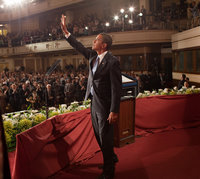When the White House first announced President Barack Obama's decision to give a speech in Cairo in order to "reset" U.S.-Muslim relations last June, American pundits from the left and right criticized the speech's location, its timing and its presumed content.
Skepticism dominated Middle Eastern commentary as well. In a region battered by conflict and profoundly suspicious of Western intentions, the history of the 20th century, as taught in schools, was dominated by the narrative of colonialism and national liberation, war and resistance. From this perspective, Britain and France simply passed the imperial torch to the United States. So the new president could hardly be expected to erase the haunting memories of Iraq, Gaza, Lebanon, Abu Ghraib and Guantanamo from the Muslim collective consciousness with a simple speech.
Nonetheless, much like his politically inconvenient Philadelphia race speech, Obama was somehow able to convert skeptics into believers. Hard as it may have seemed at the height of the Abu Ghraib scandal in 2006, just three years later, an American president received several standing ovations from a predominantly Muslim audience in the most populous capital of the Arab world.

